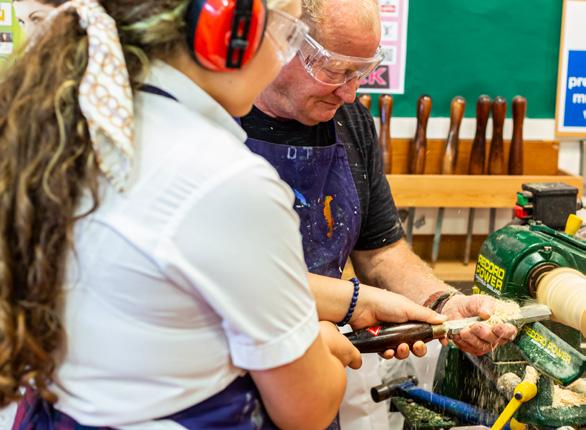
5 minute read
Design & Technology
Mr J Hoad Head of Design & Technology james.hoad@ditchampark.com
M PARK SCHOOL
Examination Board AQA y child is known and valued
Why study Design & Technology?
DITCHAM PARK SCHOOL
Where ever y child is known and valued
What will I learn?
Design & Technology Course Content
“Design & Technology is a phenomenally important subject.
Logical, creative and practical, it’s the only opportunity students have to apply what they learn in Maths and Science.”
Sir James Dyson Founder and Chairman of Dyson and Patron to the D&T Association
GCSE D&T opens the door to a wide range of careers in the creative, engineering and manufacturing industries. It is also excellent preparation for careers in many other fields including medicine, law and computer science. Whatever career you choose, the knowledge and skills you learn, particularly those concerned with rapidly developing technologies, will be extremely valuable. You will also develop skills, such as teamwork and time management which are highly prized by employers.
The Design & Technology course covers the use of woods, metals, polymers, systems, electronics, card/ graphics and fabrics/textiles in a single qualification.
You will build on what you learnt about designing and making in Key Stage 3.
You will use your knowledge and skills to design and make new and better solutions to real problems - on your own and with others - working with the materials you choose.
Key areas of development will include:
• Understanding users, their needs and their characteristics
• Designing
• Using testing, evaluation and the views of users to improve designs
• Learning about materials
• Analysing products
• Learning how things work
• Evaluating your own work and that of others
Examination and Assessment
The course will be assessed by the way of one 2 hour written examination and one piece of non examined assessment (coursework), each of these assessments makes up 50% of the total grade.
Classes in D&T are limited to 16 pupils to allow pupils to develop their ideas, models and extended projects in a suitable workspace.
Mrs S Wey Head of Drama susie.wey@ditchampark.com
y child is known and valued
Where ever y child is kn
Why study Drama?
A young person with a successful GCSE Drama qualification has the following advantages.
• The starting block to pursuing a career in Theatre and other Creative Industries as an actor, a director, a producer, a playwright, a designer, a stage manager or administrator
• The top 3 most desirable skills employers are looking for:
LinkedIn recently published findings for the top 3 skills employers are looking for in 2022 and beyond. All of these skills are highly developed during the GCSE Drama course and include…
CREATIVITY ‘drama creates individuals who can think outside of the box and take risks’
COMMUNICATION ‘drama allows individuals to develop the ability to effectively communicate ideas in order to persuade colleagues and stakeholders to follow your lead’
COLLABORATION ‘drama develops the ability to work effectively as part of a team to brainstorm ideas, problem solve and devise innovative solutions’
The course also provides the opportunity for pupils to work practically as well as academically and to follow an EXCITING and VIBRANT programme of study which will involve them in experiencing LIVE THEATRE PRODUCTIONS and participating in WORKSHOPS with professional actors/theatre companies.
Examination and Assessment
Component 1: Devising
(Practical and written coursework worth 40% of GCSE)
Content overview
• Create and develop a devised piece from stimulus
• Performance of this devised piece or design realization for this performance
• Analyze and evaluate the devising process and performance
Assessment overview
• Internally assessed and externally moderated
• Students produce a portfolio covering the creating and developing process and analysis and evaluation of the process
• A devised performance/design realization
Component 2: Performance from Text
(Practical coursework worth 20% of GCSE)
Content overview
• Students will either perform in and/or design for two key extracts from a performance text
Assessment overview
• Externally assessed by a visiting examiner.
• Group, solo and/or partner-based routes for assessment
Component 3: Theatre Makers in Practice

(Written examination worth 40% of GCSE)
Content overview
• Practical exploration and study of one complete performance text
• Live theatre evaluation
Assessment overview
• Examination of 1 hour and 45 minutes
Mrs H Bond Head of Modern Foreign Languages heather.bond@ditchampark.com
M Park School
Examination Board Eduqas y child is known and valued
Where ever y child is know DITCHAM
Park Sc
French
1. French in the world
More than 270 million people speak French worldwide. It is the official language of Belgium, Benin, Burkina Faso, Burundi, Cameroon, Canada, Central African Republic, Chad, Comoros, Côte d’Ivoire, Democratic Republic of the Congo, Djibouti, Equatorial Guinea, France, Guinea, Haiti, Luxembourg, Madagascar, Mali, Monaco, Niger, Republic of the Congo, Rwanda, Senegal, Seychelles, Switzerland, Togo, and Vanuatu.
2. French in the job market
The ability to speak French and English is an advantage on the international job market. France is the world’s fifth biggest economy, ranks third for foreign investment, and with 89 million visitors a year, is the most visited country in the world. For certain organisations ie the CERN Centre in Switzerland, a good command of French is a requirement. Paris has the highest number of engineers working in research and development in the whole of Europe. It is home to a large number of elite universities in this field and France is home to international companies such as Airbus, Thales, Mercedes-Benz and Renault.
3. Art, Fashion, Cuisine, Architecture
Think Eiffel Tower, think Louis Vuitton, think Daft Punk and David Guetta, Monet, Cézanne and Picasso. French is the international language of fashion, theatre, the visual arts, dance and architecture and culinary expertise. Our own Gordon Ramsay learnt French by working for world renowned chefs in both Paris and the Alps in his early twenties.
4. French’s connection to other languages

Half of all English words come from French. By learning a foreign language you are more likely to learn grammatical terminology than by studying your own. French also shares common roots with Spanish, Italian, Portugues and Romanian so may make learning a third language easier. Plus, you will have acquired some good learning techniques from your school studies that you can take with you into the future.
5. Ditcham’s trip to France
At Ditcham, we aim to run a language trip each year so there is plenty of scope for you to use your French abroad.
Mrs H Bond Head of Modern Foreign Languages heather.bond@ditchampark.com
M PARK SCHOOL
Examination Board Eduqas y child is known and valued
DITCHAM PARK SC
Where ever y child is know
What will I learn?
Theme 1: People and Lifestyle
Topic 1: Identity and relationships with others
Topic 2: Healthy living and lifestyle
Topic 3: Education and work
Theme 2: Popular Culture
Topic 1: Free-time activities
Topic 2: Customs, festivals and celebrations
Topic 3: Celebrity culture
Theme 3: Communication and the world around us
Topic 1: Travel and tourism, including places of interest
Topic 2: Media and technology
Topic 3: The environment and where people live
The good news
The new French GCSE has been made easier. The government has recognised that it made things a little difficult in the past and is on a drive to encourage more pupils to take it at GCSE and beyond. Universities like students with an A level in a foreign language as it makes us more marketable internationally.

Examination and Assessment (Exam Board AQA tbc)
There is a listening, reading speaking and writing paper, each worth 25%.
• Listening – 35 mins foundation, 45 mins higher
• Reading – 45 mins foundation, 1 hr higher
• Speaking – 7-9 mins foundation, 10-12 mins higher. The exam is conducted by your teacher
• Writing – 45 mins foundation, 1 hr higher







